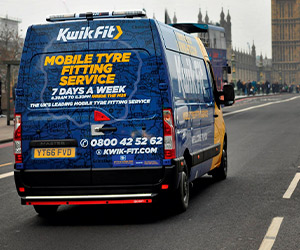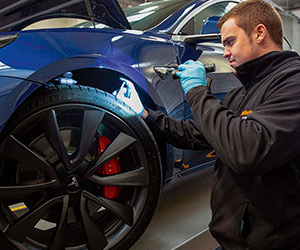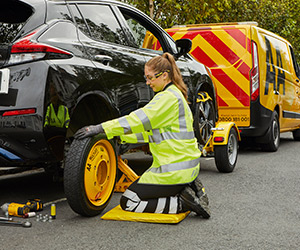 Product Categories
Product Categories
Servicing, Maintenance & Repair (SMR)
Finding the right SMR supplier is essential to the smooth running of vehicle fleets over time
Fast-forward to…
- What is SMR?
- How SMR Works
- Things to consider when choosing SMR suppliers
- SMR for the EV transition
- SMR summary
Servicing, Maintenance & Repair (SMR) Buying Guide
What is SMR?
SMR covers a range of fleet services that are crucial to the safety and smooth running of any vehicle fleet.
• Scheduled Maintenance – Regular service packages that ensure vehicles are maintained in line with manufacturer guidelines
• Mobile Maintenance – On-site vehicle servicing and minor repairs to minimise vehicle downtime.
• Repair Management – Coordination and management of vehicle repairs, including accident repairs and regular wear and tear maintenance.
• Tyre Management – Comprehensive tyre servicing and replacement, including on-site support and mobile tyre fitting.
• MOT Testing Services – Arranging and managing MOTs to ensure compliance with UK road safety laws.
• Specialist maintenance and repair, eg: refrigeration, HGVs and mobile plant.
• EV repair and maintenance. Is an increasingly large and important part of the sector.
“As your fleet transitions to electric vehicles (EVs), several adjustments may need to be made to SMR contracts to accommodate the different needs of EVs”
How SMR works
Typically, SMR (Service, Maintenance and Repair) in the vehicle fleet industry involves managing the ongoing upkeep of vehicles to ensure they remain roadworthy and cost-effective. Contracts can vary, offering tailored options depending on a fleet’s needs. Here’s an overview of how SMR works:
- Contracts – Fleet operators typically enter into SMR contracts with providers, covering scheduled services, maintenance and repairs. Contracts can be pay-as-you-go or fixed, where operators pay a set fee for all SMR services over a period.
- Full-service contracts – These include comprehensive coverage, where all servicing, maintenance and repairs are handled by the provider. Costs are spread evenly across the contract period, offering predictability in budgeting.
- Maintenance-only contracts – This focuses on routine servicing and basic maintenance, such as oil changes and tyre rotations. It may not cover repairs from accidents or unexpected damage.
- Pay-as-you-go – Businesses pay for services as and when needed. It provides flexibility but can lead to unpredictable costs.
- Mobile servicing – Some providers offer mobile repair units, where technicians come to the vehicle's location, minimising downtime for the fleet.
- Leasing with SMR – Many leasing agreements incorporate SMR services, where the leasing company manages all upkeep, providing peace of mind for fleet operators.
- Fleet management software – This can be used to track vehicle health, flag when maintenance is due, and help optimise SMR scheduling to reduce downtime.
- Service-level agreements (SLAs) – These detail the standards expected from SMR providers, including response times and availability of replacement vehicles.
- Fleet audits – Some SMR contracts include regular audits to review the condition of vehicles and ensure they meet safety and operational standards.
- Flexible contracts – Some businesses may opt for rolling contracts or flexible terms, adapting to changing fleet sizes or requirements.
Things to consider when choosing SMR suppliers
When selecting a partner for an SMR contract, there are several key factors to consider to ensure it suits your business needs:
- Scope of services – Clarify what is covered, including routine maintenance, repairs, wear and tear, and unexpected breakdowns. Determine if replacement vehicles are included during repairs.
- Cost structure – Understand the pricing model. Fixed contracts offer budget predictability, but pay-as-you-go contracts may be more flexible. Compare both options to decide what fits your financial planning.
- Contract length – Review the duration of the contract and whether there are penalties for early termination or options to adjust the fleet size during the contract period. Bear in mind your possible EV transition if considering a longer contract.
- Service intervals and scheduling – Check the frequency of scheduled services and whether the provider can accommodate your operational hours to minimise vehicle downtime.
- Geographic coverage – Ensure the SMR provider can service your fleet across all operational locations, particularly if your fleet is dispersed, operates nationwide or on the Continent.
- Service-level agreements (SLAs) – Pay attention to SLAs covering response times for breakdowns, how quickly repairs will be completed, and whether there are guarantees on parts availability.
- Provider reputation and experience – Investigate the reliability and industry experience of the SMR provider. Consider their expertise in handling the specific types of vehicles in your fleet, including specialised or electric vehicles.
- Vehicle downtime and replacement policy – Assess what provisions are in place to keep your business running when vehicles are out of service, including replacement vehicles or loan options.
- Reporting and monitoring tools – Ensure the contract includes clear reporting systems for tracking vehicle health, maintenance history and costs, ideally through digital platforms or fleet management software.
- Flexibility and scalability – Consider whether the contract is adaptable to future changes, such as an increase or reduction in fleet size or transitioning to electric vehicles.
Balancing these factors will help ensure your SMR contract aligns with both your operational and financial goals.
SMR for the EV transition
As your vehicle fleet transitions to electric vehicles (EVs), several adjustments may need to be made to SMR contracts to accommodate the different needs of EVs:
- Scope of services – EVs require less maintenance than traditional vehicles, so services like oil changes or exhaust repairs are no longer necessary. However, specialised services for EV components, such as battery health monitoring and motor maintenance, should be added.
- Cost structure – Since EVs have fewer moving parts, their servicing costs may be lower. The SMR contract should reflect this change, with a focus on battery and software maintenance rather than traditional mechanical repairs.
- Battery maintenance and replacement – Contracts should include specific provisions for battery inspections, performance checks and eventual replacement if needed. Battery health is a major consideration for EV fleets.
- Charging infrastructure – Include services related to charging infrastructure, such as mobile charging solutions or partnerships with public charging networks. Some providers may also offer maintenance for in-house charging stations.
- Technician expertise – Ensure the SMR provider has certified technicians trained in EV maintenance and repairs. EVs require different skills and tools than traditional combustion engine vehicles.
- Service intervals – EVs often require less frequent servicing due to fewer wear-and-tear components. Adjust the service intervals in the contract to reflect the reduced need for routine maintenance.
- Software updates – EVs rely heavily on software, which may need regular updates and diagnostics. Ensure that the contract includes provisions for software updates and bug fixes, either remotely or during servicing.
- Geographic coverage – If your fleet operates across wide areas, check if the SMR provider can support EV-specific needs such as charging points and trained technicians in all necessary locations.
- SLAs for downtime – Given the importance of battery life and charging, it may be necessary to adjust SLAs for quicker response times for EV-related issues, especially for charging system failures or battery malfunctions.
- Environmental benefits – Highlight any potential reductions in your overall SMR costs due to fewer consumables, such as oil and filters, and discuss the potential environmental benefits of including green maintenance practices in the contract.
- Flat batteries – How will fleet drivers cope/be covered if they run out of power while driving for work?
SMR summary
Carefully-considered SMR contracts are vital to UK vehicle fleets, as they provide predictable costs, minimise downtime and ensure vehicles are maintained to high standards. Well-structured contracts help businesses manage servicing, repair, and maintenance efficiently, reducing unexpected expenses and extending vehicle lifespans. These contracts also support compliance with safety regulations, help optimise fleet performance and improve cost management by offering tailored solutions.
For fleets transitioning to electric vehicles, SMR contracts are key to covering specialised maintenance, ensuring smooth operations, and supporting the adoption of greener technologies.
Search other Category Guides
OR
Keep up to date with all the latest fleet product news
The FleetWise Connected newsletter is the quickest and easiest way to keep on top of all the product news from the fleet and EV industries. We carefully curate and edit all the big news stories from the sector each fortnight, delivering only the information you need, as concisely as possible. FleetWise Connected is a ‘waffle-free zone’, because we know you’re busy.




